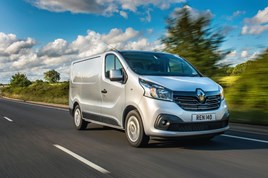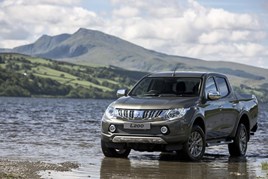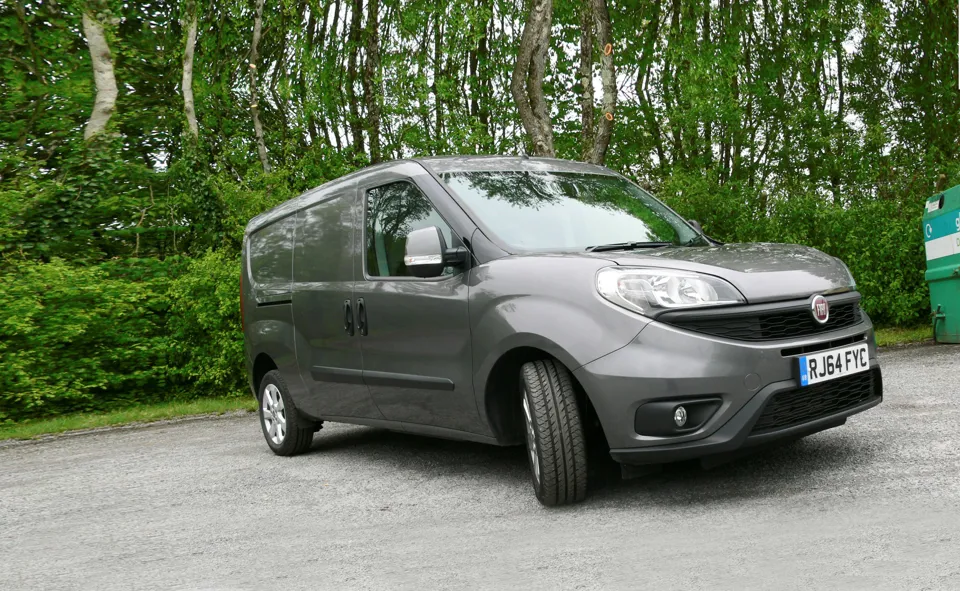Behind the apparent calm and business-like running of the Fiat Professional enterprise that UK van fleet buyers have come to know and respect, there have been some massive upheavals.
Following Fiat’s tie-up with Chrysler in 2014 – a move which brought about the new Fiat Chrysler Automobiles (FCA) – a whole new way of thinking has emerged at the company. And it is one in which the possibility of global domination is being talked about.
Since 2011, Fiat Professional, the light commercial vehicle arm of the Fiat Group, has been run in the UK by Sebastiano Fedrigo (Fedrigo has just left to manage cars for Fiat and Abarth). On arrival here from Italy, he wasted no time in bringing his own charismatic flair to the operation, making many fleet friends along the way and increasing Fiat van sales to record levels in 2014. Under his guidance, Fiat Professional was voted van fleet manufacturer of the year at the Fleet Van Awards in 2014.
Now, the firm is set to crank up its fleet credentials by a significant degree with the appointment of Domenico Gostoli as CEO of Fiat Professional in Europe, the Middle East and Africa. On his recent whistle-stop visit to the UK, both Gostoli and Fedrigo met with Commercial Fleet to explain exactly how the new stance would help to improve Fiat’s service for UK van fleets.
Gostoli was appointed after spending 15 years at various jobs within Iveco – another arm of the Fiat group. He’s passionate about his work and makes no bones about the commitment he expects from his staff. “When we merged with Chrysler, it changed our perspective and our way of doing things and now we are working totally differently,” he says. “In 2004 Fiat was on its last legs, to be honest, but now our two firms are fully integrated and present a new identity in FCA.”
Fiat Professional factfile
Models Fiorino, Doblò Cargo, Scudo, Ducato
Sales 2014 14,900, up 7.5%
Market share 2014 4.6%
Sales 2015 (Jan-June) 7,450, up 3%
Market share 2015 (Jan-June) 3.9%
“The old Fiat is dead – we are now a global player with major brands to our name. All my energy is now going into shaking up the organisation from the bottom to the top so that everyone thinks of the customers and the problems they are facing. I don’t see this is happening with everyone in the organisation at present and I’m aiming to change that. We are trying to recruit young people with a passion who are not afraid of putting forward new ideas and making mistakes. This will be the key to success: when everyone at Fiat Professional thinks in this way.”
One of the problems that Gostoli and Fedrigo are painfully aware of is that, in the UK, Fiat products have historically suffered from build quality problems. It is a reputation that dies hard, despite various moves to improve the way its vans and cars are designed and put together.
Gostoli says: “We are aware that what is perceived about Fiat in the UK is not what we feel inside. We are working hard to end this misconception and it is my personal commitment to create a different level of service for fleet customers.”
Another problem for Fiat is that three out of its four vans on offer – Ducato, Scudo and Fiorino – are also rebadged by Citroën and Peugeot as the Relay/Boxer, Dispatch/Expert and Nemo/Bipper.
However, unlike the other rivals, the Fiat offerings have their own engines – and these engines return better fuel economy, thus making the Fiat versions more cost-effective.
Fedrigo says: “We are not the cheapest on the market for front-end costs. But when I am talking to fleet customers, no one mentions front-end price anymore. Everyone is talking about total cost of ownership, and this is where Fiat vans cannot be beaten. Fuel accounts for 38% of the price of running a van but it annoys me that some tenders we are asked to quote for don’t even mention this. We need to educate some fleets about how important fuel costs are, because at present some of them don’t understand.”
One of the ways Fiat is proving its point is by offering vans on extended loans to fleets so they can be fuel-tested against existing models in real-life terms. At present, official fuel economy figures are calibrated on a rolling road so bear little resemblance to what businesses can expect when the vans are used in the real world.
Fedrigo explains: “When fleets test our vans against their present ones, they invariably find that they return better fuel economy.
“It is for this reason that we have gained some big fleet customers such as BT Fleet and Royal Mail. We also offer fleet software that can save up to 15% extra on fuel. This software opens up the vehicles to the fleet manager and gives a true measure of how the drivers are performing.
“I am confident that our engines are better and more cost-effective than any others on the roads. Ours are true industrial engines, whereas all the others are derived from cars.”
But while Fiat’s engines may offer better fuel economy, this doesn’t always translate into better residual values at auction when the vans are sold – and here the Fiat brand suffers, as lower RVs mean higher wholelife costs.
Fedrigo admits this.
“RVs are the weak link in our brand and we are working to improve them,” he says.
“We have to do more to create awareness of the benefits of our vehicles, such as the better fuel economy, and increase our brand awareness. Badge engineering has, in a way, affected RVs as, when people buy a Citroën Nemo or Relay, they don’t think that these vehicles are built by Fiat so they are in fact buying Fiat. In 2011, the Ducato’s RVs were lower than the Citroën Relay but now they are higher and we believe that the message about our brand is gradually getting through.”
Another way Fiat Professional is improving its offering to fleets is the continual development of its dealer network. At present there are 73 dealers across the country and Fedrigo is hoping to boost this number to 100 by the end of next year.
He says: “The dealers are the first point of contact for many of our customers and we realise how important they are.
“Our focus is on keeping our customers on the road and we aim to copy our partners at Iveco with their 24/7 levels of truck service where we can.
“When I took over Fiat Professional I wasn’t happy with the network as it was and I sacked 52 dealers across the country who I felt were under-performing. It was a strategy that paid off as customer service has improved as a result.”
Gostoli’s ultimate goal is ambitious, but clear-cut: “We want the world No1 slot for Fiat light commercial vehicles.”
The changing face of Fiat’s van range
By the end of next year, Fiat Professional will have upgraded or relaunched its entire van range as the battle for sales goes on unabated. Last year, the Ducato, the manufacturer’s best-selling van, was facelifted, with new looks and engines. This year saw the mid-life relaunch of the Doblo Cargo, with a fresh front-end, better ride and handling and upgraded engines.
 The next 12 months will see a flurry of activity as the Fiorino gets a mid-life wash and brush-up while a new Scudo medium panel van is set to appear, although as yet it has not been decided whether or not the name will change.
The next 12 months will see a flurry of activity as the Fiorino gets a mid-life wash and brush-up while a new Scudo medium panel van is set to appear, although as yet it has not been decided whether or not the name will change.
This van will be a reworked Renault Trafic and we asked whether or not it will also sport separate Fiat engines, as other models in Fiat’s line-up that are shared with Citroën and Peugeot do. The answer was that no decision had been made yet, although the expert money is on a Renault powerplant, maybe tweaked by the Italians.
Finally, Fiat is set to launch its first ever one-tonne pick-up, in a new tie-in with Mitsubishi. This vehicle, as yet unnamed, will be a reworked L200, a model which in itself has just been upgraded and relaunched.
In another surprise move, it was announced recently that Vauxhall was breaking its ties with Fiat, which at present produces the Combo as a rebadged Doblo. Instead, Vauxhall will be joining with Peugeot/Citroën to produce a small van based on the Partner/Berlingo.
 Does this move mean that Fiat is looking for a new field to share the Doblo with?
Does this move mean that Fiat is looking for a new field to share the Doblo with?
Sebastiano Fedrigo says: “While we are certainly open to different markets, we don’t feel an urgent need to find a new partner for Doblo. We already have a huge market for this van.”
Fiat favours CNG over electric power
Domenico Gostoli delivered a stinging rebuke to the green lobby in the UK, which is at present talking up the benefits of electric-powered vans.
There are various Government incentives for fleets to buy into zero emission vehicles, but most of the major manufacturers, including Fiat, don’t offer electric vans in their ranges.
Gostoli says: “I am hearing a lot about a boom in electric vehicles but, so far, it is all talk – I don’t see a boom at all. If we were to sell an electric Ducato we would have to charge around 50,000 euros and that is too high a price for businesses to pay. It is not something we would want to put on the market. After all, who is going to pay such a price for a vehicle which will only do 100km before it needs to be taken off the road and recharged?”
However, Gostoli did say that Fiat was keeping an eye on the development of electric power, adding: “Things may change when we have to conform to even stricter emissions standards in 2020. Maybe then we will have to produce an electric van. Until then we have no plans.”
This does not mean, however, that Fiat isn’t interested in greener forms of power. The problem lies in the differences between fuel usage in Britain and the rest of Europe.
Gostoli says: “We produce CNG-powered vehicles in Europe and we feel that this is a much greener and more useful fuel than electricity. But the problem is that, while we are a leader in CNG in Europe, Britain doesn’t have any refuelling infrastructure for CNG.”

















Login to comment
Comments
No comments have been made yet.